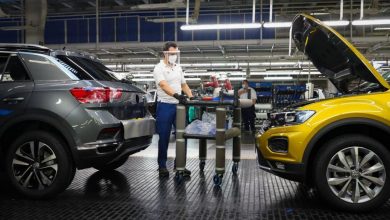
Investors Hit the Brakes on Automotive Startups
Fervor for self-driving tech cools, and an accelerator in Detroit shuts down.
Last year, Ted Serbinski called his accelerator, Techstars Detroit, the “‘comeback city’s’ startup ecosystem.” Since 2015, the accelerator had supported and mentored 54 transportation-related companies, with funding from some big transportation names, like Ford, Honda, AAA, and Nationwide. Success stories included Cargo, a startup that helps ride-hail drivers make supplemental income by running rider-friendly “convenience stores” out of their cars; Splt, a ride-share company acquired by Bosch in 2018; and Acerta, which applies machine learning to automotive manufacturing.
But this year, Techstars Detroit won’t take on new startups. Instead, it’s shutting down, as earlier reported by TechCrunch. “Right now, there is no funding,” says Serbinski, the accelerator’s managing director. Part of the organization’s collapse is due to internal issues within Techstars, a global network of accelerators and itself a startup, Serbinski says. But the venture capitalist also blames trade winds within the automotive sector: a shift away from autonomous-vehicle investment and toward electrification, and a drive (no pun intended) toward less experimental businesses that can actually make money.
Figures from the data and research company Pitchbook released last week are revealing. Companies in the “mobility” sector, which includes those working on autonomous and electric vehicles, ride-hailing, auto commerce, transportation logistics, and micromobility, are still humming, raising $33.5 billion in venture capital from 756 deals in 2019. But that’s $25.2 billion less, and 130 fewer, than the year previous.
Automakers, inspired by government regulations in China and Europe and the promise of easier-to-build and cheaper-to-maintain electrics, continue to pour billions into electrifying their offerings, the data shows. But they pulled back from “mobility-as-a-service” offerings, like car-share.
Last year’s giant investments in autonomous-vehicle companies like Aurora and Nuro kept the total amount pouring into the robot car sector at record levels. But there were fewer deals, and early- and seed-stage investment in AVs tapered off—a sign that the industry is getting less buzzy and more mature.
Autonomous vehicles “are definitely in that ‘trough of disillusionment,’” says Tarek Elessawi, a principal at the early-stage investor Plug and Play, referring to the stage in the consultancy Gartner’s “hype cycle” when interest ebbs in a once-hot technology. “We were pretty optimistic about where autonomy was going in 2016 and 2017. Then in 2018, pragmatism started to set in.” By late 2018, even the putative industry leaders at Waymo acknowledged that they were not ready to let totally driverless cars loose on the roads.
Global auto sales fell 4.4 percent last year, according to forecasting service LMC Automotive. The slump was especially pronounced in China, where sales of light vehicles fell by 8.3 percent, the biggest drop in at least 20 years.
Partly as a result, venture capitalists say, automotive companies and suppliers are more interested in focusing on what they do best—manufacturing vehicles, building out new hardware—than wild experiments in ventures that may or may not turn a profit. Last year, Ford shut down its recently acquired shuttle service, Chariot, and General Motors, Daimler, and BMW wound down their US-based car-sharing services. Those projects were vestiges of excitement around mobility—and some fear of upstarts like Uber, which once threatened to rewrite the automotive game but now struggle with questions of profitability.
Now, “the experimental money and access to easy money is gone” in the automotive industry, says Serbinski. He says he’ll continue to advise the companies that emerged from the local Techstars, and invest in the transportation space.





